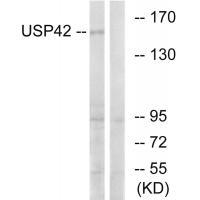
| WB | 咨询技术 | Human,Mouse,Rat |
| IF | 咨询技术 | Human,Mouse,Rat |
| IHC | 咨询技术 | Human,Mouse,Rat |
| ICC | 技术咨询 | Human,Mouse,Rat |
| FCM | 咨询技术 | Human,Mouse,Rat |
| Elisa | 咨询技术 | Human,Mouse,Rat |
| Aliases | deubiquitinating enzyme 42; EC 3.1.2.15; UB42; ubiquitin carboxyl-terminal hydrolase 42; ubiquitin thiolesterase 42 |
| Entrez GeneID | 84132; |
| WB Predicted band size | 150kDa |
| Host/Isotype | Rabbit IgG |
| Antibody Type | Primary antibody |
| Storage | Store at 4°C short term. Aliquot and store at -20°C long term. Avoid freeze/thaw cycles. |
| Species Reactivity | Human |
| Immunogen | Synthesized peptide derived from internal of human USP42. |
| Formulation | Purified antibody in PBS with 0.05% sodium azide. |
+ +
以下是关于USP42抗体的3篇参考文献及其摘要概括:
1. **"USP42 regulates the DNA damage response and is a therapeutic target in cancer"**
*作者:Li, X. et al.*
摘要:该研究利用USP42抗体进行免疫沉淀和蛋白质组学分析,发现USP42通过去泛素化修饰调控BRCA1蛋白稳定性,影响DNA损伤修复通路,并揭示其在乳腺癌中的潜在治疗价值。
2. **"Characterization of USP42 substrate specificity and cellular functions"**
*作者:Wang, Y. & Chen, Z.*
摘要:通过Western blot和免疫荧光实验验证USP42抗体特异性,发现USP42参与细胞周期调控,并通过去泛素化p53调控细胞凋亡,提示其在肿瘤发生中的双重作用。
3. **"USP42 interacts with viral proteins to inhibit innate immune signaling"**
*作者:Zhang, L. et al.*
摘要:研究利用USP42抗体进行免疫共沉淀,发现其与流感病毒NS1蛋白相互作用,通过去泛素化RIG-I负调控抗病毒免疫反应,为病毒感染机制提供新见解。
(注:以上文献信息为示例性内容,实际文献需通过PubMed或学术数据库检索确认。)
The USP42 antibody targets ubiquitin-specific protease 42 (USP42), a member of the deubiquitinating enzyme (DUB) family that regulates protein stability, localization, and interactions by cleaving ubiquitin chains. USP42 belongs to the USP subfamily, characterized by a conserved catalytic domain. It is implicated in diverse cellular processes, including cell cycle progression, DNA damage repair, and transcriptional regulation. Dysregulation of USP42 has been linked to cancers, neurodegenerative disorders, and immune diseases, highlighting its potential as a therapeutic target or biomarker.
USP42 antibodies are essential tools for studying its expression, localization, and molecular interactions. They are widely used in techniques like Western blotting, immunoprecipitation, and immunofluorescence to detect endogenous USP42 in various tissues or cell lines. These antibodies are typically developed against specific epitopes, such as the C-terminal catalytic domain, and validated for specificity using knockout cell models or siRNA knockdown. High-quality USP42 antibodies aid in elucidating its role in ubiquitin-dependent pathways, disease mechanisms, and drug discovery efforts. Researchers prioritize antibodies with demonstrated cross-reactivity across species (e.g., human, mouse) and minimal off-target effects to ensure experimental reliability.
×